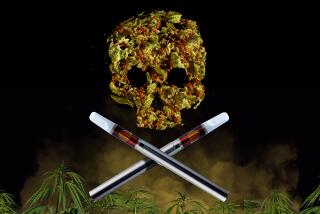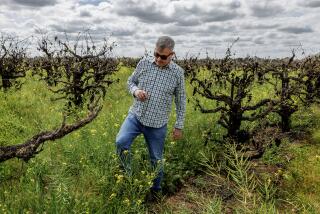U.S. to crack down on smearing of olive oil’s reputation
- Share via
The federal government has become serious about virginity — at least when it comes to olive oil.
Propelled by complaints about slippery food purveyors selling low-end product as high-end goods, or olive oils being doctored with cheaper canola, safflower or peanut oils, the U.S. Department of Agriculture this fall will roll out new standards to help ensure that consumers buying “100% extra virgin” olive oil get what they pay for.
Demand for the greenish-gold oil is surging in American kitchens. Consumers here sopped up 79 million gallons in 2008 — up from 47 million gallons a decade earlier. And according to a trade group, consumers annually spend about $720 million on the stuff at supermarkets.
But a lack of strict standards means the U.S. is awash in low-quality, adulterated and even dangerous oils that have made some consumers ill, according to experts. The new rules are voluntary — not mandatory — so the prospect of more slick shenanigans continues.
Connecticut investigators tested dozens of bottles of olive oil from store shelves a few years ago after local producers and consumers complained that there was something fishy — or perhaps nutty — going on. They were right.
“People were getting sick and thinking, ‘It must be the poultry that I fried up in the olive oil last night,’ or that it was a type of bread that had been exposed to nuts in the bakery,” said Jerry Farrell Jr., commissioner of the Connecticut Department of Consumer Protection. Early this year, his team returned to the market aisles after hearing rumbles of more sly shortcuts.
“It took a while for people to identify that the oil itself is the thing that was making them sick,” Farrell said.
Many industry officials agree that “extra virgin” olive oil is essentially oil that is cold-processed to prevent degradation of aromatic compounds and has higher levels of healthy fats and antioxidants. It also has relatively low acidity levels, 0.8 grams per 100 grams or less, according to the International Olive Council in Madrid, whose product standards the USDA rules are generally based upon.
Federal law bars a company from not disclosing on the label that it is selling a blend of oils. But the practice of labeling lower-quality olive oil as top-end — and charging a premium for it — is technically legal in the U.S.
The reason is simple: There are no federal rules that define what is — or is not — “virgin” or “extra virgin” olive oil, said Vito S. Polito, professor of plant sciences at UC Davis and co-chairman of the school’s Olive Center, a research group.
As a result, Polito said, “the U.S. has been a dumping ground for cheap olive oil for years.” Most olive oil consumed in the United States is imported from nations including Spain, Italy, Greece and Portugal. California, which dominates the domestic industry, produced 850,000 gallons of olive oil worth about $17 million during the 2009-10 season.
Although it’s hardly the worst oil crisis facing the U.S. at present, the purity issue remains a serious one. People with health concerns or allergies often use olive oil for cooking. And extra virgin oil is marketed as a premium consumer product, and routinely commands an equally prime price: At the Pavilions grocery store in Seal Beach, a 750 milliliter bottle of Bertolli’s extra virgin olive oil cost $14.29, while the same size bottle of Bertolli’s extra light olive oil cost $7.99.
Making extra virgin oil can be labor-intensive, with some producers hand-picking the olives while others manually bottle the oil. Lower quality oils, or adulterated oils, are cheaper to produce.
Competition from those who use unsavory practices has become a significant problem for producers such as Antoinette and Shawn Addison. The California couple first planted olive trees in the rolling hills of the Santa Ynez Valley in 2000 and dreamed of transforming their 25-acre farm into a high-end producer of artisanal oils.
But when the couple met with grocers and food retailers, they sensed trouble. A 375-milliliter bottle of their Organic Estate Blend Extra Virgin Olive Oil sells for $16.95. Competitors sold theirs for $9.99 or less.
“A lot of the stores didn’t care what was in the bottles,” said Antoinette Addison, whose Figueroa Farms has struggled to break even. “All they cared about was the fact that the label said ‘extra virgin.’ ”
A spokesman for the Food and Drug Administration, which oversees most food-label accuracy issues, said the agency does not regularly test olive oils for adulteration, and that it relies on tips about problems from the public, trade groups and others.
Bob Bauer, president of the North American Olive Oil Assn., said the majority of what consumers buy in stores is legitimate product. The group routinely alerts the FDA to problems: He said 3% to 4% of the 200 to 300 olive oil samples his group tests each year are adulterated or mislabeled.
“We’ve petitioned the FDA to create a standard of identity, which would define in black and white what olive oil is and is not,” said Bauer, whose group represents the majority of the companies that import oil into the U.S. “They never acted on the petition.”
Some state lawmakers also are trying to cork the problem. California and Oregon, like Connecticut, have rolled out their own state regulations. (The California regulation established definitions for various grades of olive oil; it requires such oils sold in the state to be labeled according to international standards.)
New York is expected to join them by this fall, and a bill on the issue has been introduced in the New Jersey Legislature, Bauer said.
Among other things, the USDA regulations set chemical parameters for freshness and oil purity; for fatty acid levels, which helps distinguish seed oils from olive oils; and for ultraviolet light absorption, which tells how fresh the oil is and how pure the process was during preservation. They include tasting reviews conducted by a panel of USDA experts.
However, companies only have to follow these regulations if their products have the federal seal of approval on their labels, or if retailers buying their oil require it.
“It’s like saying you have to stop at stop signs, but there are no cops at the corner,” said Paul Vossen, a University of California Cooperative Extension farm advisor for Sonoma County. “Standards are a good start, but enforcement is important.”
More to Read
Eat your way across L.A.
Get our weekly Tasting Notes newsletter for reviews, news and more.
You may occasionally receive promotional content from the Los Angeles Times.










